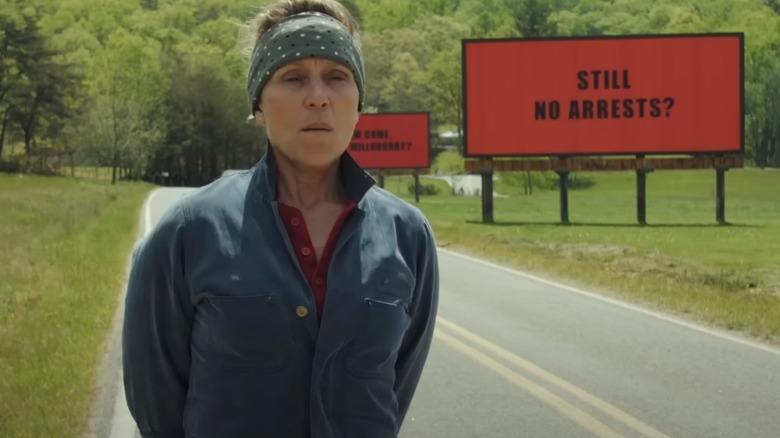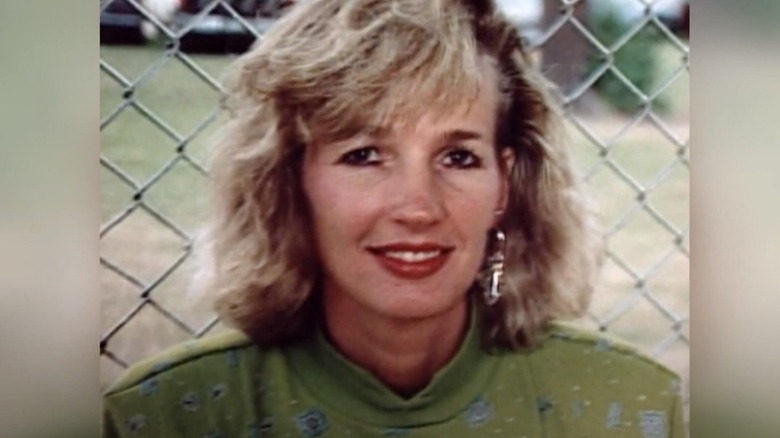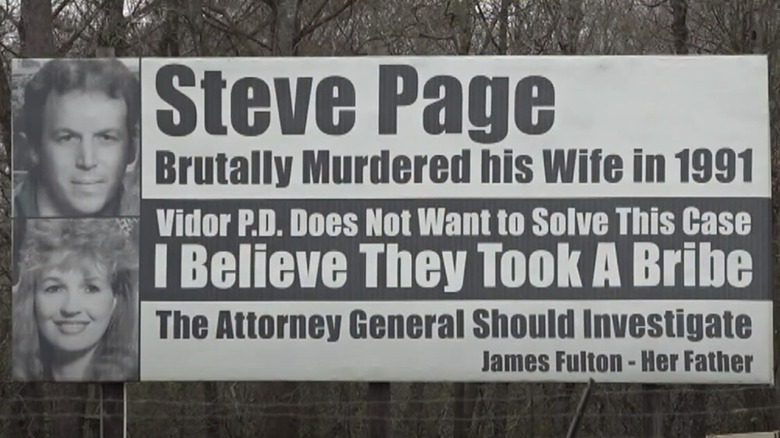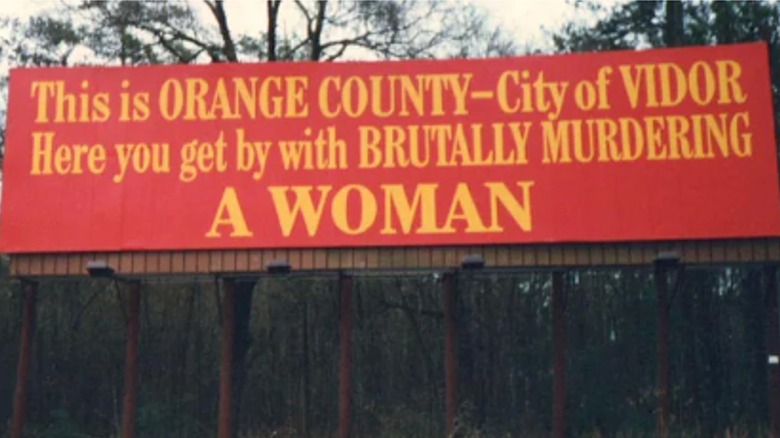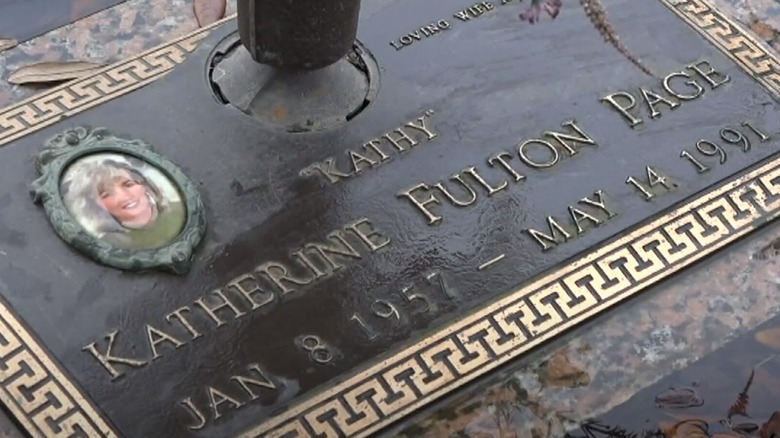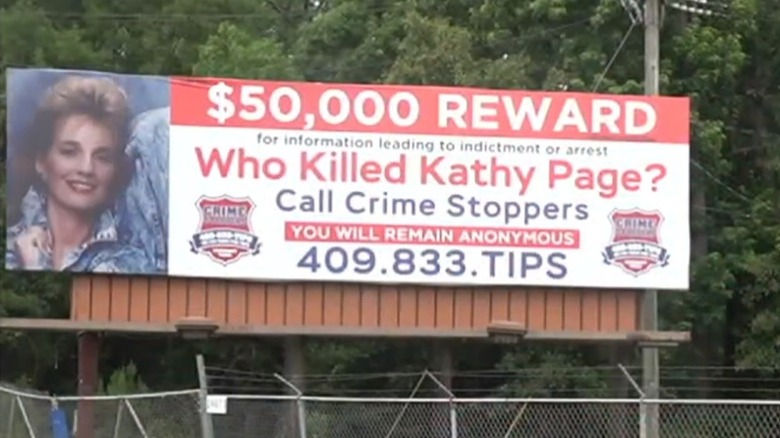The Murder That Inspired Three Billboards Outside Ebbing, Missouri
"Three Billboards Outside Ebbing, Missouri" is one of those films that no one can really decide what it is, aside from the fact that it's really good. It's got a respectable 90% on Rotten Tomatoes, and it's described as a crime drama and a dark comedy. It takes a lot — from careful writing to incredible acting that in this case is carried by Frances McDormand — to get that combination right, but still, a mother trying to get justice for the unanswered sexual assault and murder of her teenage daughter doesn't immediately scream "hilarious."
Now, add in the fact that it's based on a true story — kind of — and that's surprising even for a black comedy. Playwright and filmmaker Martin McDonagh was inspired by real billboards in a real small town in America, but the story behind those billboards is very, very different.
He explained to the Los Angeles Times that he'd seen the billboards while he was taking a bus through the American South: "... the concept came from that image, which stayed in my mind for years: What kind of pain would lead somebody to do that? It takes a lot of guts — and a lot of anger." In the real-life version, that pain came not from a mother faced with the terrible abuse and murder of a teenage daughter, but from a father, determined to hold the justice system accountable for failing to find the person who murdered his adult daughter. The true story is anything but comedic.
The discovery of Kathy Page
When the body of Kathy Page was first discovered, it seemed to be simply a tragic car accident. She was behind the wheel of her vehicle, which was recovered from a ditch just about a hundred yards from her home in Vidor, Texas. That was how it first seemed, though, and first impressions can be deceiving. When the story was featured on Unsolved Mysteries, the police sergeant interviewed said that it wasn't long before it became very, very obvious that the scene had been staged to look like an accident ... and it was staged very badly.
In addition to the fact that Page had none of the impact injuries associated with a car accident, there were other telling signs, too: Her feet were tucked under her, her soda wasn't spilled, and she was sitting against the seat, even though her seat belt was unbuckled. Detective Sgt. Ray Moseley explained, "[It was] plain to see this was a staged incident instead of an accident." Moseley continued: "Kathy Page was not killed in her vehicle. She was killed at another location, cleaned up, redressed, and placed back in her vehicle, and after the vehicle had been rolled into the ditch."
Law enforcement, therefore, had every reason to believe this was foul play. Page was discovered on May 14, 1991, and when "Three Billboards Outside Ebbing, Missouri" hit theaters in 2017, Page's father and her children still had not gotten closure.
A prime suspect soon emerged
The autopsy done on Kathy Page supported the idea that she had been murdered. Her body showed signs of a struggle — including a broken nose — and it appeared as though she had been strangled and had sex at some point during the night, which had started when the mother-of-two — who was estranged from her husband — had headed out to meet her boyfriend for a date.
That boyfriend was very quickly cleared of any involvement in her death, but it was her sister, Sherry Valentine, who would provide some important information during her testimony in a wrongful death suit against Steve Page, Kathy's husband. Kathy's nighttime routine involved taking off her makeup and showering when she was getting ready to turn in for the night. The fact that she was found with no makeup and no jewelry suggested that she'd already been home before she died.
Kathy had asked Steve Page to watch their two daughters while she went out for the night, and Detective Sgt. Ray Moseley told Unsolved Mysteries that when he informed him of the accident and her death, he immediately found his reaction suspicious: "He said, well, his wife was not home and directly looked straight down the street towards where the car was. Steve seemed to be quite upset. He began to cry, and at times, threw himself on the couch, crying. But yet, he would jump right back up, and we were talking, and there would be no signs of tears in his eyes." Steve Page became the prime suspect.
There were accusations of domestic violence
Kathy Page's husband, Steve Page, was at the center of the investigation into her murder, and when things started coming out about their relationship, it didn't really help him. According to him, she had only requested a short separation: "Mainly she was uncomfortable with who she was ... She wanted to try to find out who Kathy was. Because of that, we talked about separating for a short period of time and allowing her to hopefully find herself."
Her sister, Sherry Valentine, told a completely different story to Unsolved Mysteries. She said that the marriage was completely, 100% over, and that just the decision to file for divorce had taken a massive weight off her shoulders. Valentine said that Kathy was in the process of filing for divorce, and that it had actually been a long time coming. When Valentine spoke with the Daily Mail, she said that she'd always had a bad feeling that the marriage was doomed from the start, even going as far as calling Steve "controlling." She explained, "I always thought of Steve as being a pretty arrogant person. ... I didn't want them to ever be married."
Valentine even claimed that she had seen her sister covered in suspicious bruises and made some serious accusations that she was the victim of domestic violence. Steve has vehemently denied those accusations.
A father's frustration
Months dragged on, and although Kathy Page's father, James Fulton, was convinced that her estranged husband had killed her, he had little success in getting law enforcement to believe him. According to The Orange Leader, Fulton was simply told that there was a "person of interest" in his daughter's death, but it's easy to see how that wouldn't be enough to satisfy a grieving father. In December of 1991, he made an attempt to appear at a city council meeting but wasn't put on the agenda and was told that he couldn't speak. So, he took matters into his own hands and decided he was going to get attention in another way.
Fulton started with three signs along the road to town: "Vidor Police Botched Up The Case," "Waiting for Confession," and the eerie "This Could Happen To You" (via The Cinemaholic). The signs have changed over the years and have included one that read: "This is ORANGE COUNTY — City of VIDOR; Here you get by with BRUTALLY MURDERING A WOMAN" (via The Daily Mail).
Yet another read (in part): "Vidor's Garbage-Dump Park. Security Provided by the Local Police Dept. I believe my daughter was being raped while she was strangled to death in 1991. ... I believe the Police Dept. did not want to solve the case. Will you be the next unsolved murder? ... — James Fulton." Over the years, his family estimates that he'd spent somewhere in the neighborhood of $200,000 on the billboards.
Steve Page was found guilty in a civil suit
While criminal cases must prove guilt beyond a reasonable doubt, civil cases only require someone to be found liable for the death in order to result in a guilty verdict. That's importance, because in 2000, Kathy Page's parents, James and Dorothy Fulton, and her daughter, Monica Page, were awarded a win in a civil suit filed against Steve Page (via FindLaw).
Examination of Kathy's body led to the conclusion that she had been killed elsewhere, then dragged into her car, and the accident staged. It's important, then, to note that one of the key pieces of evidence in the trial was a strange comment made by Steve: He had said he didn't want authorities in the house, because there were blood stains on the carpet — which he claimed got there after Kathy cut herself shaving. No one questioned remembered seeing any such stains, but Kathy's mother recalled him telling a different story about stained carpet, saying it was fish grease. Testimony that he was cleaning and drying the carpet after finding out about the death of his wife was deemed suspicious, along with testimony that had him burning unknown items shortly afterward.
Further testimony indicated that just after Kathy's funeral, Steve and some of his family members were again cleaning the carpet — claiming they were getting rid of grease stains. Add in motive stemming from the divorce, and the verdict came back: "More than a scintilla of evidence supports the jury's finding that Steve Page killed Kathy Page."
Here's what Steve Page had to say
In the civil suit filed over the wrongful death of Kathy Page, her estranged husband, Steve Page, offered his side of the story. According to him, findings that she had been sexually assaulted before her death were inaccurate, and he claimed they had consensual sex before she left to go out for the evening. Kathy, he said, never returned home, contrary to what others said her lack of makeup and jewelry suggested.
Steve's account in court documents (via FindLaw) of what had been going on in Kathy's life — and in their relationship — at the time of her death changed a few times. During the civil suit, he acknowledged that his previous claims that she'd gotten involved in using cocaine weren't true, and he added that he'd just been repeating things he'd supposedly heard from other people. It also came out that he'd tried to prevent Kathy's autopsy and the police investigation into their home. He said that he had friends who had been set up by the department, insinuated that the department wasn't above planting evidence, and he was worried it was going to happen to him.
So, what did he think happened? He made some serious claims (via Unsolved Mysteries), saying, "I received threats on the phone that the same thing that happened to my wife could happen to me. There's a certain person here in Beaumont that ... may have been involved. It's a very prominent family ... an Italian family ... to let you know that they're considered a part of the Beaumont mafia."
Steve Page says the billboards ruined his life
In 2018, Steve Page spoke with the Daily Mail and talked about the billboards that were still up. At the time of the interview, the billboard read: "Steve Page Brutally Murdered his Wife in 1991; Vidor P.D. Does Not Want to Solve This Case; I Believe They Took A Bribe; The Attorney General Should Investigate; James Fulton — Her Father."
He said that the billboards had forced him to move — he was living in Houston at the time — and he added that they had "ruined my entire life." He continued, "I've got two kids, that's their mother. We [had] to drive by that sign when we go there. But there's nothing I can do — he owns the land. ... You want someone to blame. The police bungled the case and told [Kathy's family] I'm the one to blame, because they can't figure out what really happened. They turned all their anger to me."
James Fulton was 86 years old and added at the time of the interview that he had no intentions of abandoning his billboard campaign. In addition, he was also continuing to place ads in local newspapers, appealing to anyone who might have information about his daughter's now decades-old murder.
Kathy Page's daughters have faced their own struggles
Kathy and Steve Page had two daughters, Erin and Monica Page. Both testified in the civil trial against their father but told somewhat different stories. Erin, for example, testified that she had never seen signs that there was anything violent about her parents' relationship, even saying that she'd never seen them argue. She also testified in support of her father's claim that he'd spilled grease on the carpet, and that's what he was cleaning up. Monica, on the other hand, said that she and her mother actually shared a room.
Erin continues to update her blog, dedicated to making sense of her mother's murder. "A Billboard in Texas" is still being occasionally updated as of 2023 and features a post comparing her father to Alex Murdaugh. The case, she wrote, brought up memories of her mother's case.
When Kathy's case was featured on the Crime Junkie podcast in 2022, the Beaumont Enterprise gave an update on the case — and as far as that went, there really wasn't much to report. They did, however, say that in 2011, Monica died of a drug overdose, and in 2012, Erin posted about that day on her blog, writing, "My sister is dead. I make them let me see her once she is loaded by the funeral home. I kiss her forehead. I whisper, 'I loved you just like you wanted to be loved.' I repeat it a few times and kiss her again. My sister is dead."
There is still a reward being offered for information and hope for justice
Kathy Page's case is still listed on the website for the Texas Department of Public Safety, along with a $3,000 reward for information. In 2021, 12 News reported that Crime Stoppers of Southeast Texas had added another $50,000 onto that reward, making it the largest ever offered by that division of the group.
Vidor's police chief, Rod Carroll, was less than hopeful that the reward money would make much of a difference, though, and when he spoke with the Beaumont Enterprise shortly after the increase, he confirmed that new tips had led to no new information. Carroll believed that it was going to take something much more than money to get a confession or evidence that would lead to a conviction.
"What it's going to take is someone who found God in their life, because most of the people in this are older people that say, 'You know what, I'm going to get this off my chest. I'm going to tell everything that I know because I know how this whole thing went down,'" he said. Eerily, he continued, "And honestly, I know how this whole thing went down. But I need for someone to come forward and say, 'Hey, I was there and I heard this person talk about it, I heard this person talk about it, and I heard this person talking about it.' ... that's what we're going [to] need to have happen."
What are the chances it'll be solved?
The fact that Kathy Page's father is still waiting to see justice done for his daughter decades after her murder is heartbreaking stuff, but it's also worth using that case as a segue into talking about just how widespread this problem is. Page's murder definitely isn't the only unsolved one out there, her family isn't the only one looking for justice, and the actual numbers are staggering.
NPR says that since the 1960s, somewhere around 200,000 murder cases have gone unsolved. Not only that, but the numbers suggest that pre-1960s, there was a higher chance that a murder case would be closed. Experts say there's a number of reasons for why that might be — starting with the fact that the relationship between law enforcement and the public has only continued to deteriorate over the decades.
Crime analyst Jeff Asher says (via The Atlantic) that a massive decline in unsolved murders kicked off in the 1990s — around the same time that Kathy Page was killed — and he put forward some fascinating theories as to what's going on. In addition to racism in the justice system and the prevalence of gun crimes, he suggested that a major factor could involve the popularity of crime shows. Real-life jurors have become more demanding in the evidence they need to convict, making law enforcement more hesitant to arrest and district attorneys more hesitant to prosecute on evidence that may have been sufficient in the 1980s. Will that evidence ever surface for Kathy Page?
